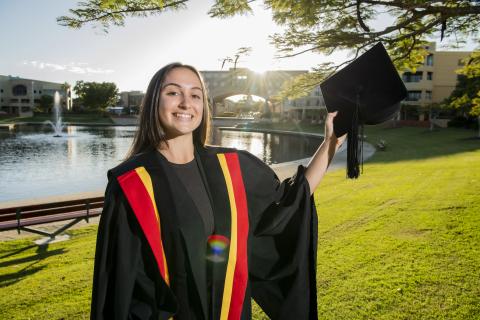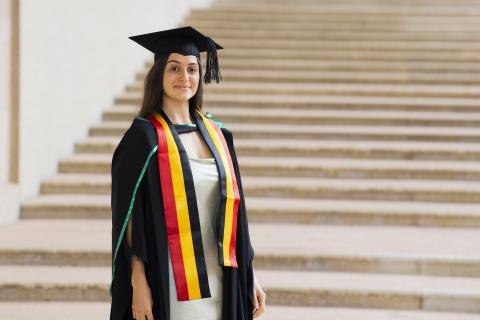
When Myria Cano-Hall accepted a scholarship to attend Bond University, there weren’t many in her family who she could turn to learn about what university life would entail.
Other than her grandmother who had completed a teaching degree in the early 1990s, Myria - a proud Kokotha woman from Port Augusta in South Australia - would be the only member of her family to ever take up a university offer.
Not that the then 17-year-old had given a move to Bond University a huge amount of preliminary thought.
“I was in Year 12 and looking at going overseas on a soccer scholarship,” she says, “but a friend came back from finishing a degree at Bond and spoke highly of her experience there.
“I’d never even heard of it! I was lucky enough to get my application in for the scholarship just in time.”
The shift east was a huge decision.
Not only was Cano-Hall young but she was also leaving behind an extremely tight community.
“We are all very close back home” she says. “We do a lot together in community. Then there were the sporting networks. I played a heap of soccer, basketball, and netball. All of a sudden, I was leaving these close-knit groups completely.”
That’s where Bond University’s Nyombil Indigenous Support Centre stepped in. Nyombil supports Aboriginal and Torres Strait Islander students so they can thrive academically.
“Without Nyombil I don’t think I’d have made it through,” she says. “I had no family around me. It was a very lonely time at first. Nyombil helped me engage with people, make friends, engage with sports. They were so supportive. It was like a home away from home.”
Cano-Hall originally had her heart set on a Sport and Exercise Science degree. Because she didn’t complete maths at Year 12 level, she had to take on a Bachelor of Health Science instead.

What seemed like a speedbump quickly transformed into an opportunity when she developed a keen interest in the science of nutrition.
“I knew that I’d found a way to help other young athletes", she said.
“I found a path from my undergraduate course into a Master of Nutrition and Dietetic Practice. It wasn’t easy. I needed to do medical biochemistry 1 and 2 in a single semester which made life pretty hectic there for a while. But it was worth it.”
And the experience may well have inspired Cano-Hall to hang around just a little bit longer.
“There is a little bit of talk about a PhD looking at Indigenous athletes in the lead up to the 2032 Olympics here in Queensland. That could be quite interesting.”
While Cano-Hall thinks that idea through, she can also proudly reflect upon becoming the first person in her family to obtain a Master’s degree. She’ll also spend time growing her dietetics practice and invest time in her new sporting love, CrossFit.
Butchulla/Goreng Goreng man Paul Martin is the Nyombil Indigenous Centre Coordinator.
He remembers when Cano-Hall first walked into the Centre.
“She had her struggles in those early days,” he says. “But here she found a space where she could build some momentum.”
He says he has mixed feelings about Cano-Hall finally moving through.
“It’s obviously exciting,” he says. “You think about levels of doubt among Indigenous people and our relationship with education hasn’t always been as strong as it should be. But to be able to see young people excel in education is a great thing.
“Still, it’s also little bit bittersweet. They come in like these little gazelles and they trip, stumble, and sometimes fall but eventually, they find their way to succeed.
“You’d like it if they could sprinkle a little bit of their magic dust around the place so they can leave a few lessons behind for others to pick up on.”
Learn more about the Nyombil Indigenous Support Centre here.
Learn more about the Bond University Indigenous Scholarship here.